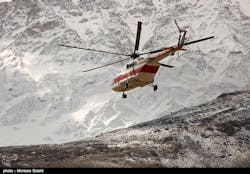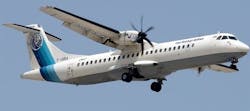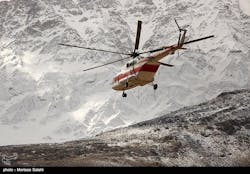Aging turboprop aircraft crashes in Iran, killing dozens just months after reentering service
SEMIROM, Iran. An ATR-72 twin-engine turboprop aircraft operated by Aseman Airlines for short-haul regional passenger transport crashed in Iran, killing all 65 people on board. The aircraft had just reentered service months before, after being grounded for seven years.
Conflicting reports indicate six flight crew members and either 59 or 60 passengers, a total of 65 or 66 people, perished in the crash.
Photo: Tasnim News Agency
The aircraft, conducting Flight EP3704 from Tehran to the south-western city of Yasu, crashed into Mount Dena in foggy and windy weather on 18 Feb. 2018, officials say.
Red Crescent search-and-rescue teams were able to locate and reach the crash site in a remote area in the south of Iran one day later, on 19 Feb. 2018. Russian officials are said to have helped teams find the wreckage. Military unmanned aircraft systems (UAS) were going to be used, but the winds prevented it.
Industry pundits speculate that the aircraft had been grounded for seven years due to an inability to purchase the needed aircraft parts from Western countries. The U.S. imposed economic sanctions on Iran due to its frowned-upon nuclear pursuits and associated activities, including a uranium enrichment program.
Officials at the Civil Aviation Organization of Islamic Republic of Iran (CAO.IRI) estimate the age of the aircraft at 25 years and are calling the cause of the crash “unclear”. French aviation authorizes are en route to the crash site to assist.
The ATR 72 twin-engine turboprop, short-haul regional airliner was developed and produced in France and Italy by aircraft manufacturer ATR, a joint venture of French aerospace company Aérospatiale (now Airbus) and Italian aviation conglomerate Aeritalia (now Leonardo S.p.A.).
Photo: Tasnim News Agency
Officials at Aseman Airlines, the third largest airline in Iran, signed a Memorandum of Agreement (MOA) in April 2017 expressing their intent to purchase 30 Boeing 737 MAX airplanes with a list price value of $3 billion. The agreement provides the airline with purchase rights for 30 additional 737 MAXs. Deliveries were to start in 2022.
Boeing negotiated the MOA under authorizations from the U.S. government following a determination that Iran had met its obligations under the nuclear accord signed in 2015. Boeing will look to the Office of Foreign Assets Control for approval to perform under this transaction. Boeing continues to follow the lead of the U.S. government with regards to working with Iran’s airlines, and any and all contracts with Iran’s airlines are contingent upon U.S. government approval.
For more images, visit: https://www.tasnimnews.com/en/news/2018/02/19/1661223/french-team-to-visit-iran-over-plane-crash


